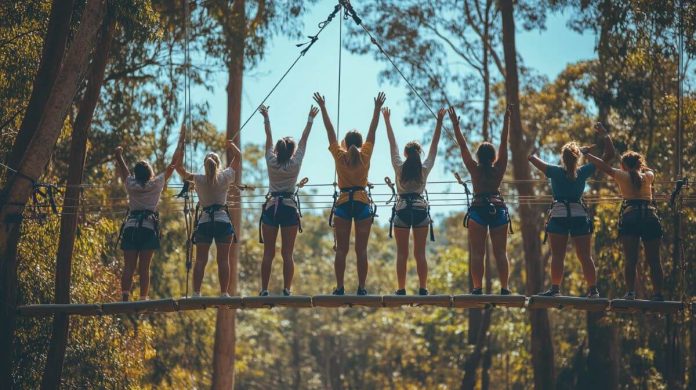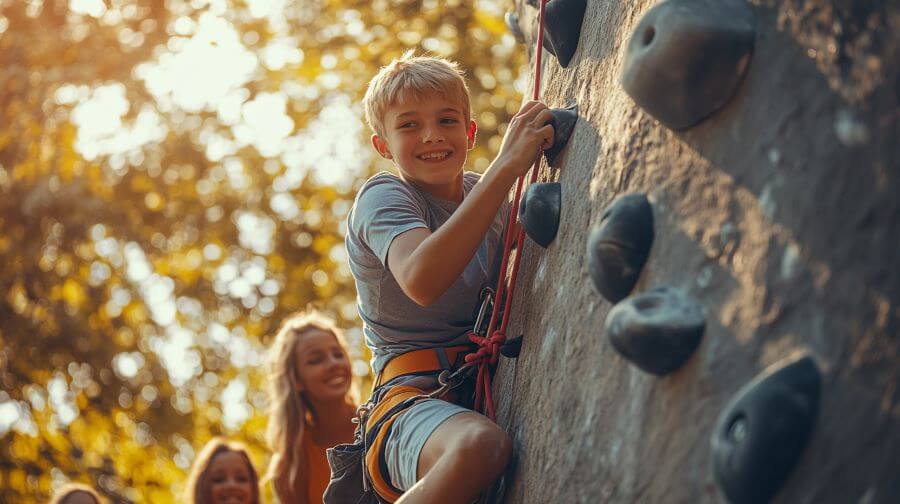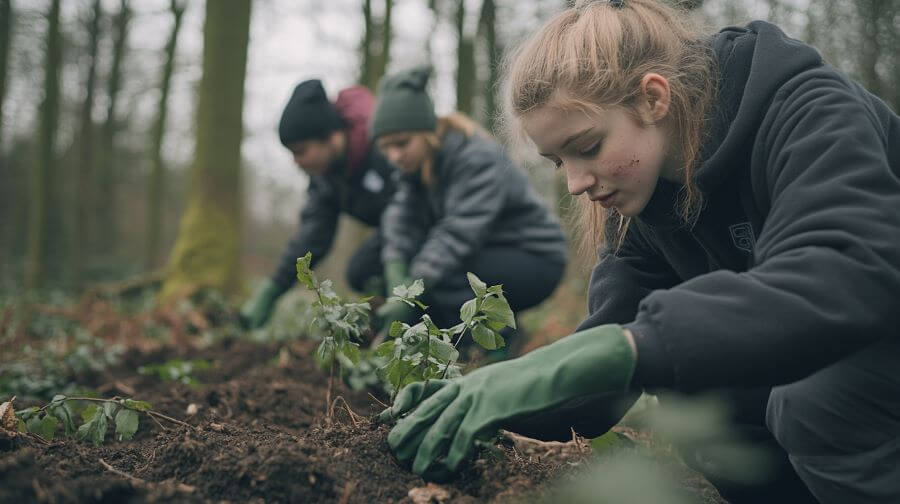
Last Updated on 3rd October 2024
Outdoor experiences provide young people with opportunities to develop critical life skills, improve their physical and mental well-being, and strengthen social connections. For youth club members, outdoor activities can offer a sense of adventure and exploration while fostering personal growth in a way that traditional indoor activities might not.
Organised youth club trips to outdoor adventure centres or camps can have a lasting impact on members, providing experiences that help shape their character and confidence. Here are some of the key benefits of outdoor experiences for youth club members.
Research from the UK’s Natural Connections Project shows that outdoor learning significantly improves students’ engagement, behaviour, and well-being. Around 92% of children involved reported feeling happier and healthier, while 72% of teachers noticed enhanced social skills and communication among pupils.

1. Builds Confidence and Self-Esteem
One of the most significant benefits of outdoor activities is the boost in confidence that comes from overcoming challenges. Whether it’s completing a high ropes course, climbing a rock wall, or navigating a team-building exercise, these activities require participants to step outside their comfort zones. Achieving success in these tasks, no matter how daunting they may seem at first, gives young people a sense of accomplishment and pride.
For youth club members, outdoor experiences provide a safe and supportive environment where they can push their limits and discover what they are capable of. This newfound confidence often extends beyond the activity itself, empowering members to take on new challenges in other areas of their lives, from schoolwork to social situations.
2. Enhances Social Skills and Teamwork
Outdoor activities frequently require participants to work together, solve problems as a group, and rely on one another to complete tasks. This collaborative environment creatives strong social bonds and improves communication skills. Youth club trips that incorporate team-building exercises help members develop trust, cooperation, and the ability to work effectively with others.
These experiences teach valuable social lessons, such as the importance of active listening, patience, and leadership. By working together to achieve common goals, youth group members learn how to navigate group dynamics, handle conflicts, and celebrate shared successes. These skills are crucial for building positive relationships and fostering a sense of community within the club.
3. Improves Physical Health
Outdoor experiences typically involve physical activities, from hiking in mountains or a woodland setting and canoeing to climbing and obstacle courses. For many young people, outdoor adventure trips provide a break from sedentary activities like screen time and encourage them to get moving. Physical activity is essential for maintaining health and well-being, and outdoor adventures make exercise fun and engaging.
Participation in outdoor adventure activities helps improve strength, endurance, and coordination while also promoting a healthy lifestyle. Additionally, spending time in nature can reduce stress and anxiety, improving both physical and mental health.

4. Promotes Resilience and Problem-Solving Skills
Outdoor experiences often present challenges that require participants to think critically and adapt quickly. Whether it’s finding a way to cross a river during an orienteering challenge or working through a difficult rock-climbing route, these activities teach young people how to solve problems in real time.
Facing and overcoming obstacles helps youth club members develop resilience, the ability to bounce back from setbacks and persist in the face of adversity. These problem-solving skills are essential for navigating the challenges of everyday life. By learning how to break down complex problems into manageable steps, youth members become more confident in their ability to handle difficult situations both on and off the field.
5. Encourages a Love for Nature and the Outdoors
Many young people today spend a significant amount of time indoors, often in front of screens. Outdoor experiences provide an opportunity to reconnect with nature, explore the great outdoors, and appreciate the beauty of the natural world. For some, a youth club trip may be their first experience camping under the stars, hiking through forests, or kayaking down a river.
These experiences help foster a love and respect for the environment, encouraging young people to become more environmentally conscious and to value time spent in nature. This connection to the outdoors can lead to lifelong habits of spending time outside, which benefits both mental and physical well-being.

6. How Outdoor Activities Build Independence and Responsibility in Youth
Outdoor activities provide youth club members with invaluable opportunities to practise independence and responsibility in real-life settings. Whether it’s packing their own bags or managing personal belongings, outdoor trips often mark the first time many young people experience self-reliance away from home.
These experiences teach essential life skills, like team bonding, time management and accountability. By managing tasks and making independent decisions, youth members build a sense of personal responsibility that will benefit them in future challenges, both in and out of the club setting.
7. Cultural Exposure
Outdoor activities often take young people out of their usual environments and expose them to new cultures, traditions, and ways of life. Whether through organised trips to rural areas, international outdoor camps, or wilderness expeditions, these experiences provide youth with the opportunity to:
- Understand Diverse Perspectives: Engaging with people from different cultural backgrounds during outdoor activities broadens young people’s worldviews. It fosters an appreciation for cultural diversity, inclusivity, and the recognition of shared human values, all of which are crucial in today’s globalised world.
- Develop Global Awareness: When youth clubs organise international outdoor trips or cultural exchanges, participants gain first-hand exposure to different environments, languages, and traditions, helping them become more globally aware and empathetic.
- Promote Mutual Respect and Tolerance: Shared outdoor experiences, such as hiking or camping, allow young people from various cultural backgrounds to work together towards common goals, promoting mutual respect and tolerance.

8. Environmental Stewardship
Outdoor activities naturally encourage a deeper connection to nature, which can lead to environmental awareness and stewardship. Youth club members, through regular outdoor experiences, often develop:
- A Sense of Responsibility for Nature: Being in nature allows young people to witness the beauty and fragility of ecosystems first-hand. Many outdoor programs incorporate environmental education, teaching participants about local flora, fauna, and the importance of conservation.
- Sustainability Practices: By learning about responsible outdoor practices, such as Leave No Trace principles, recycling, and sustainable living, young people are encouraged to adopt eco-friendly behaviours that extend beyond the outdoor setting into their everyday lives.
- Active Participation in Environmental Conservation: Youth clubs that engage in activities like tree planting, clean-up drives, or wildlife conservation efforts help foster a sense of responsibility for protecting the environment. This not only benefits the planet but also instils a lifelong appreciation for sustainability.
9. Leadership Development
Outdoor experiences are ideal for teaching youth leadership skills in real-world settings, as these activities often require decision-making, problem-solving, and teamwork. Specific leadership benefits include:
- Opportunities for Youth Leadership: Outdoor programs frequently give participants the chance to lead a group or take charge of certain tasks. Whether it’s planning a hike route, leading a team-building activity, or managing group safety, these experiences teach youth how to lead by example, manage resources, and make sound decisions.
- Developing Communication and Conflict Resolution Skills: In outdoor environments, clear communication is essential for group success and safety. Youth who participate in these activities learn how to articulate their ideas, listen actively, and resolve conflicts effectively, all of which are important leadership qualities.
- Building Confidence through Responsibility: Many outdoor experiences, such as camping trips or orienteering challenges, require participants to take responsibility for their safety and well-being. When youth successfully navigate these challenges, they gain confidence in their ability to lead others and take on more responsibilities in the future.
Conclusion
Outdoor experiences provide youth club members with a wealth of benefits, from building confidence and teamwork skills to promoting physical health and resilience. Youth club trips that take members into the great outdoors allow them to explore new environments, challenge themselves, and form lasting bonds with their peers.
By incorporating outdoor adventures into youth club activities, leaders can help young people grow emotionally, socially, and physically, setting them up for success in all areas of life.




































